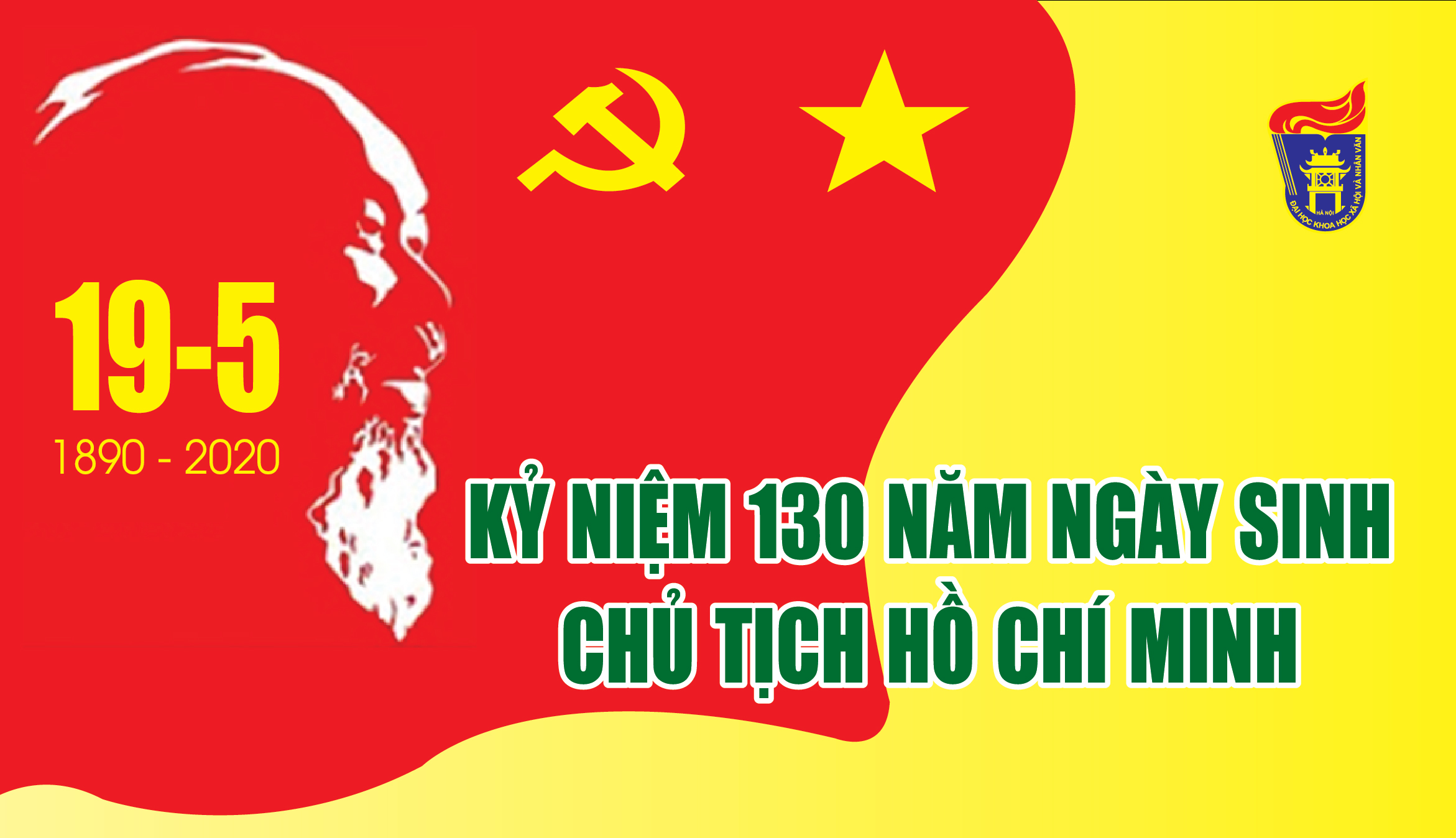
1. Independence for the nation, freedom for the people.
One of the overarching themes of the documentTestamentThis concerns the human element and Ho Chi Minh's ideology regarding human values. Ho Chi Minh's humanism was formed early on and was a constant factor throughout his rich revolutionary life, reflecting his aspirations and will to fight for human liberation, class liberation, and the restoration of independence and freedom for the Vietnamese people, while also contributing to the liberation struggles of oppressed nations worldwide.
Throughout thousands of years of history in building and defending the nation, Ho Chi Minh is one of the outstanding figures, a symbol of Vietnamese humanism..For Ho Chi Minh, human values were expressed through compassion, tolerance, fervent patriotism, and absolute loyalty to the mission entrusted to him by the Fatherland and the people. His life was a long and arduous struggle for peace and the independence of the Vietnamese nation and all enslaved peoples. Ho Chi Minh's love and respect for humanity stemmed deeply from the humanistic character of his family, lineage, homeland, and the Vietnamese nation. Through his revolutionary will and actions, Ho Chi Minh became a symbol of the struggle to affirm the cultural vitality, the will for independence, and the position of a nation.
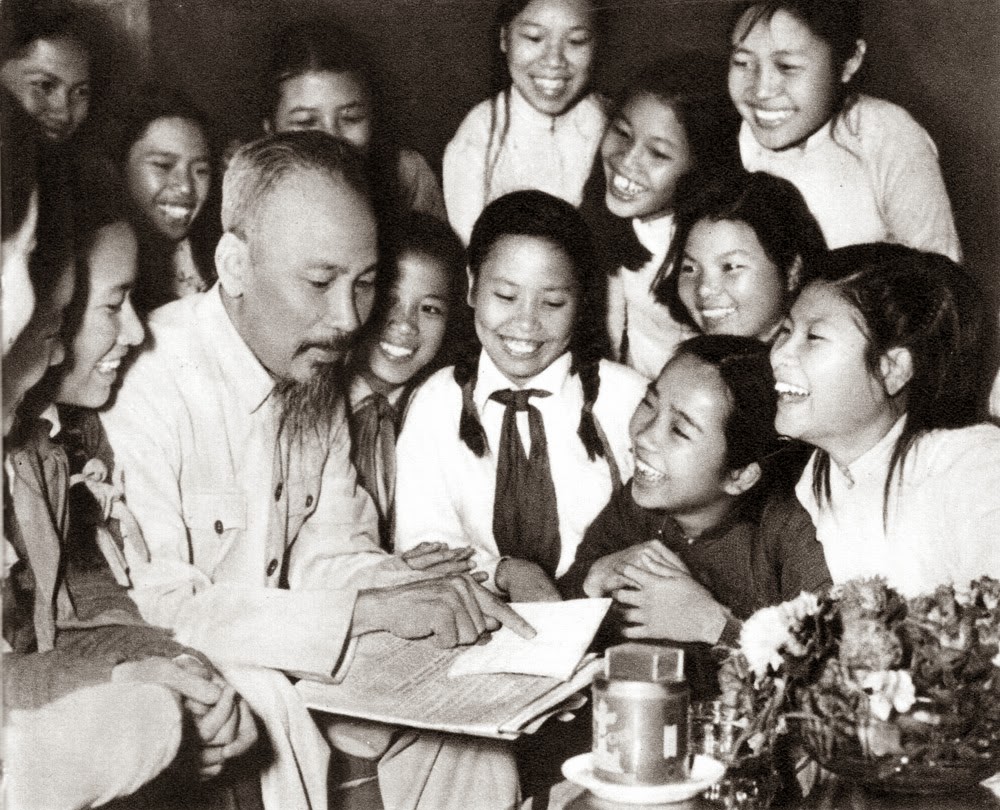
In his humanist thought, the concept of "liberation" is the core, the central value. The struggle for liberation was not only aimed at abolishing the chains of slavery but also at liberating the entire society, striving for true freedom and a prosperous and happy life for all people. Throughout his life, wherever he was, whatever his position, he always placed absolute faith in the people, especially the working class who had for generations lived in poverty, backwardness, and illiteracy. His thought reflects the age-old aspirations of the Vietnamese nation and progressive humanity. General Secretary Nguyen Van Linh once wrote: “President Ho Chi Minh was a great patriot. His patriotism stemmed from boundless love for the oppressed people. It did not stop within the national sphere but extended to the working people of the whole world. He dedicated his entire life to the cause of national liberation; at the same time, he contributed to the common struggle of the world's people for peace, national independence, and social progress. Therefore, not only the Vietnamese people cherished him, but the people of the world also reciprocated his feelings and regarded him as a close friend.”[1].
Ho Chi Minh's humanism is not only the crystallized values of Vietnamese cultural tradition and identity, but also a synthesis of the finest elements of Asian and world cultures. Born into a backward agricultural country and a Confucian family, Ho Chi Minh traveled through many countries on his journey to save the nation – "lands of freedom, skies of slavery" – encountering diverse cultures, exploring various political tendencies, and studying different ideologies. He crossed both sides of the Atlantic, settling in London and Paris. In America, he studied Washington and Lincoln; in France, he researched the Declaration of Civil and Human Rights, and admired Michelangelo and Jaurès. Modern Western humanism, though limited, opened up a horizon of universality, encountering the Confucian ideal of egalitarianism.[2].
During his years abroad, he studied and immersed himself in French culture, Soviet culture, and the new democratic culture of China, reading works by W. Shakespeare, Ch. Dickens, V. Hugo, A. France, L. Tolstoy, Lu Xun, and others in their original texts. He translated E. Pottier's *The Internationale* (France), K. Marx and F. Engel's *The Communist Manifesto*, Montesquieu's *The Spirit of the Law*, Frederick's *Secret Provincial Committee* (Russia), Sun Yat-sen's *New Democracy*, etc., into Vietnamese.[3]Due to his rich knowledge base and broad horizons, immediately after returning to Vietnam to prepare for the revolutionary movement in the autumn of 1945, he introduced and disseminated many world cultural and humanistic values to the public. In Ho Chi Minh's legacy, "His poems, essays, and speeches reflect a profound understanding of human history and civilization and a steadfast belief in the cultural identity of each nation and country, including his own and other nations in the world. Therefore, he is loved, admired, and respected throughout the world."[4].
For Ho Chi Minh, patriotism was synonymous with love for the people. His love for the people did not come from a superior being, but from empathy, shared feelings, and the transmission of sacred, ingrained values inherent in those two words: "patriotism and love for the people."compatriots"Understanding the suffering of the people, the humiliation of a nation deprived of its freedom (a nation that had once achieved much glory in the past), he yearned to find a new path for the nation, not only to fulfill the mission of restoring national sovereignty but also to achieve new levels and values in the political thinking of the era, bringing light and faith to the people."[5].
In his view, loving the people meant, first and foremost, saving them from the shackles of slavery. But to save the country and the people, one had to rely on the people, mobilizing the inherent strength of the nation itself. The people (especially farmers, workers, etc.) were the numerous, leading, powerful, and steadfast force of the revolution.[6]Relying on the strength of the people and the spirit of national unity, the Party leadership could overthrow the colonial regime and the feudal yoke. To accomplish this great feat, Ho Chi Minh sought to enrich his knowledge with the spiritual values and methods of struggle of many revolutionary leaders around the world. Therefore, "The essence of Ho Chi Minh's character is the essence of Vietnam, the essence of revolution, the essence of communism, the essence of humanism, all meeting and blending in one person and elevated by that person's historical mission."[7]In other words, "Ho Chi Minh skillfully applied the timeless principles of Marxism-Leninism to the specific circumstances of Vietnam, and history has proven him right."[8].
Ho Chi Minh's revolutionary career and humanism are closely linked to important events in the heroic struggle of the Vietnamese people. The successes of the Vietnamese revolution are compelling evidence of the creative spirit and vitality of a new model of state. In the early decades of the 20th century, Ho Chi Minh was one of the first Asians who, with his intellect, political acumen, and patriotism, absorbed Lenin's ideas on the liberation struggle of colonial peoples and transformed those theoretical weapons into material forces for the cause of national liberation.
Under his leadership, the Vietnamese people achieved victory in the August Revolution of 1945, contributing to the collapse of the colonial system of imperialism in Asia.[9]Following his call to arms, and believing in his organizational talent and character, the Vietnamese people resolutely fought to establish the first Democratic Republic in Southeast Asia and subsequently defended the achievements of the revolution through a persistent resistance war against French colonialism.[10]For Ho Chi Minh, words were always linked to actions, and theory always went hand in hand with practice. According to General Vo Nguyen Giap: "He was a brilliant strategist and a great organizer. Nguyen Ai Quoc was the first to write 'The Indictment of the Colonial Regime,' and it was he who, together with the nation, carried out that indictment."[11].
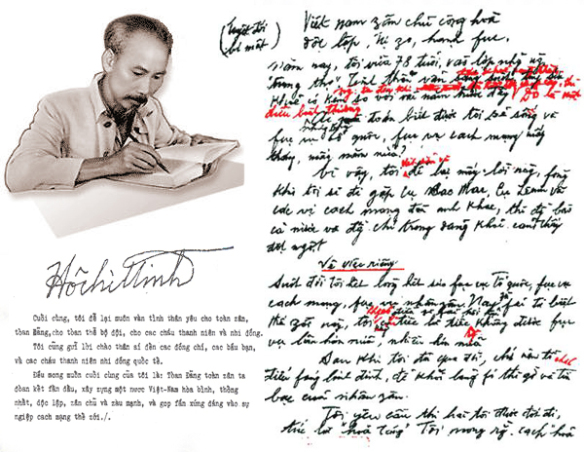
An interpretation of the origins ofHo Chi Minh's humanismHistorian Tran Van Giau argues that Ho Chi Minh was born into a family in a "sacred" region rich in cultural traditions and humanistic values. That region gave birth to a...outstanding individualsto bring glory to the country. FromThesisInspired by Lenin's ideas, Nguyen Ai Quoc embraced the great thoughts of Karl Marx and Friedrich Engels, approaching and pursuing the goals of a struggle for humanism and new values: the liberation of the country and the liberation of humanity.Ho Chi Minh's humanismOriginating from those national and international roots, it has actually achieved a high degree of harmony with the shared values of the region and humanity.
Faced with the harsh challenges of history, heeding the call to arms:Nothing is more precious than independence and freedom." and implementTestamentIn his sacred faith, for the survival of the nation and their own honor, the Vietnamese people bravely fought against many of the world's most powerful and aggressive enemies. In that noble cause, Ho Chi Minh "is remembered not only as the liberator of the homeland and people under colonial rule, but also as a modern sage who brought a new vision and hope to those who are relentlessly fighting to eliminate injustice and inequality from this earth."[12].
In the 20th century, the Vietnamese people had to confront many powerful world empires. The nation's sovereignty and independence were repeatedly and seriously threatened. Never before had Vietnam seen so many foreign invading armies simultaneously appear on its territory, and never before had Vietnam suffered so many sacrifices and losses! But Vietnam stood firm, gradually reviving and developing. This was the great revival of a nation with a strong cultural vitality. As the leader of the Vietnamese people's struggle, Ho Chi Minh became a symbol of faith, courage, wisdom, and the bravery of a nation. His strong aspiration and ultimate desire for a completely independent Vietnam, where the people are free, everyone has enough food, clothing, and education, became the guiding principle, the goal of the struggle, and the unifying force of the entire nation. Ho Chi Minh succeeded in that great endeavor because the supreme aspiration of the nation, the most heartfelt aspiration of the people, was also his aspiration and the meaning of his life.[13]"President Ho Chi Minh contributed, along with humanity, to eliminating a major obstacle on the path to a civilized world, erasing a stain on history: the colonial regime."[14].
2. The ideals of equality, fraternity, and faith in humanity.
InDeclaration of IndependenceSeptember 2, 1945, studying and inheriting the great ideas ofDeclaration of Independence1776 in America,Declaration of Civil and Human RightsFollowing the French Revolution of 1791, President Ho Chi Minh declared to the whole world the independence of the Vietnamese nation, the right to equality, the right to life, the right to freedom, and the pursuit of happiness for the Vietnamese people. This is an immortal truth, a natural law, a fact that no one can deny or violate.[15]However, throughout more than eight decades of colonial rule over Vietnam, the French colonialists sought every means to sow political discord and abolish the people's freedom and democracy. Economically, "they exploited our people to the bone, leaving them impoverished and destitute, our country desolate and impoverished."[16].
Ho Chi Minh's thoughts on humanity were always imbued with Asian philosophy and humanism. According to him, the inherent goodness and evil in each person are not natural traits but are determined by society and the educational system. Furthermore, human nature can change over time due to social factors and to adapt to the social environment. "He respected the compassion of Buddhism as the root of morality... and that sentiment harmonized with patriotism and love for the people."[17]While in Vietnam and while working abroad, Ho Chi Minh always actively and proactively absorbed the best aspects of various cultures to enrich his knowledge, humanistic spirit, and understanding of humanity. What Ho Chi Minh always cared about was the human condition, and he dedicated his entire life to the people and the country.[18].
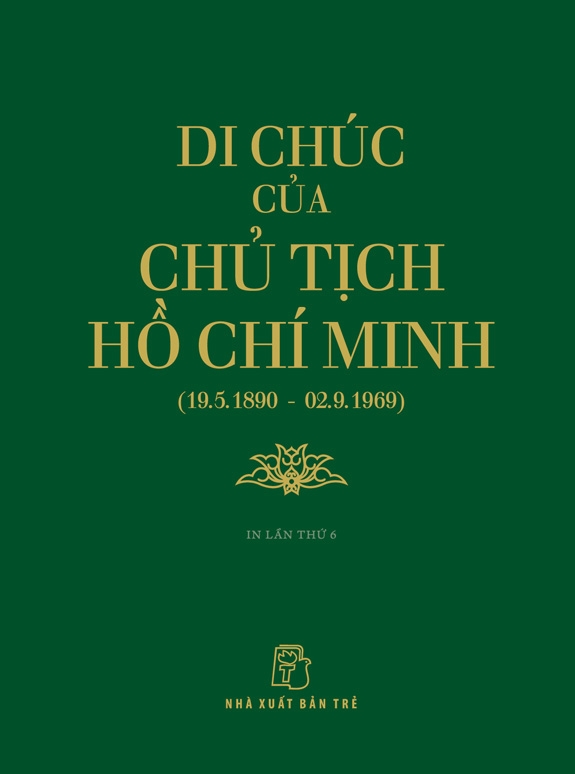
For President Ho Chi Minh, love for humanity was the overarching value that permeated all his thoughts, ideas, and actions.TestamentIt is the distillation of Ho Chi Minh's thoughts and ideas about humanity and for the sake of humanity. Human beings are the most valuable asset, the central factor determining all the victories of the Vietnamese revolution. To successfully carry out the cause of resistance and national construction, we need well-rounded individuals. These are people who possess both virtue and talent, with virtue being the foundation. He once clearly stated: "Morality can be summarized as: discerning right from wrong. Maintaining a firm stance. Being utterly loyal to the country. Being utterly devoted to the people." At any time, in any place, and in any work, cadres and Party members must "be imbued with revolutionary morality." When the Party became the ruling party, the issue of morality became even more important.
In many of his writings, Ho Chi Minh always considered human beings as both the goal and the driving force of the revolution. Ho Chi Minh's vision of humanity was not only about liberating the people from the shackles of slavery but also about ensuring their true happiness. This is the true value of the independence and freedom that generations of revolutionary fighters and people have sacrificed and shed blood to regain. Ho Chi Minh clearly saw the laws of historical movement and development and led the Vietnamese revolution to follow those laws. He "knew what he wanted and where he was going, knew how to avoid obstacles, knew how to defeat the enemy, was as still as a mountain, as dynamic as the sea, mastered the art of what is possible and constantly expanded the limits of what is possible."[19].
In Ho Chi Minh's thought, in any period of the Vietnamese revolution, human beings always hold a central position. Training and developing human resources is the central and top priority of all development plans and strategies.Testament,He demonstrated profound faith and love for humanity through his revolutionary cause, fighting against imperialist aggression, "liberating our compatriots from the shackles of slavery," considering it "the common cause of all the people," the root of all success. "Ho Chi Minh was a man with unwavering faith in the future of the nation and humanity, in socialism: This is an unchanging quality that enabled him to adapt flexibly to the myriad changes of a turbulent cause."[20]He always paid special attention to the silent contributions and sacrifices of the people. Before his passing, President Ho Chi Minh always deeply missed the South, remembering the cadres, soldiers, and compatriots who had selflessly fought and sacrificed themselves in the impregnable fortress of the Fatherland. He was concerned about not having fully fulfilled his revolutionary responsibility to the great front line and wished to return to the South soon after the country achieved complete independence.
One of the core, outstanding points inHo Chi Minh's humanismIt is an absolute belief in humanity, in the strength and noble dignity of human beings. Humans, by their very nature, are creative beings, always yearning for beauty, the right to life, and the truth and freedom. Understanding the heavy consequences of colonial rule and the tragedies caused by war, Ho Chi Minh always believed in the character, creativity, and resilience of the Vietnamese people. It is these values that have forged the heroic character of a nation.
Ho Chi Minh's humanist philosophy and love for humanity transcended national boundaries to reach the level and universal humanistic values of mankind. From the time he left to find a way to save the country to his passing, Ho Chi Minh always considered Vietnam a part of the world, and the Vietnamese revolution an organically linked part of the world revolution. Therefore, all ethnic communities around the world, regardless of skin color, language, economic status, or social standing, have always expressed their affection and respect for him. As the organizer of the resistance against French colonialism and American aggression, Ho Chi Minh always respected the French people, the American people, and all those who cherish peace in the world. This clear political thinking has led the people of the world to recognize the true values and sincerity of his ideology, thus gaining their trust, affection, and strong support for Vietnam's just struggle.
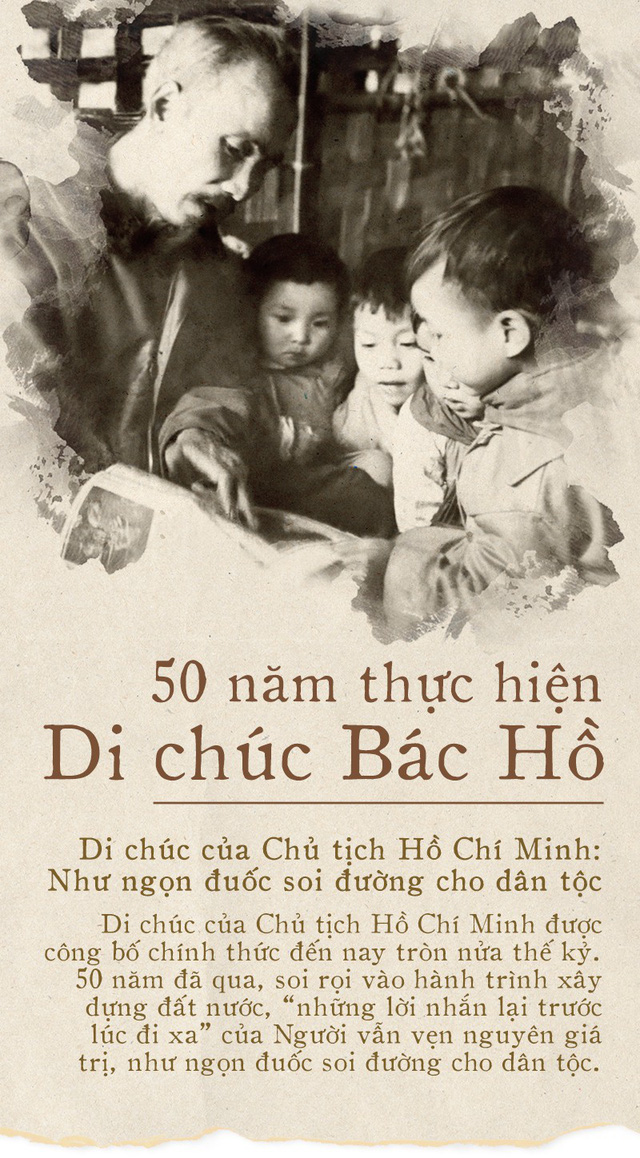
In His teachings as well as inTestamentHo Chi Minh always valued and upheld human dignity, even that of those with flaws and mistakes. He always believed that, through persuasion, education, and genuine tolerance, these people could completely correct their mistakes and shortcomings to become useful members of society. Ho Chi Minh was always strict and rigorous with organizations and with each task, but also always showed tolerance towards his subordinates and staff.[21]Ho Chi Minh's compassion was vast and profound, yet at the same time simple and natural. Every day, everyone could see that Uncle Ho loved children, respected the elderly, and valued women.[22].
For people, Ho Chi Minh not only valued the training of cadres and soldiers; he loved and cared for the people in the mountainous regions and ethnic minorities in the Truong Son - Tay Nguyen areas, providing them with every piece of clothing, every bowl of rice, every grain of salt… Ho Chi Minh was also a vivid symbol of exemplary conduct.TestamentHe once wrote: "Throughout my life, I have wholeheartedly and devotedly served the Fatherland, the revolution, and the people." Imbued with ancient and modern philosophies, both Eastern and Western, and understanding the country's economic circumstances, he championed the following ideology:Need,savings,integrity,mainand considered these to be the essential qualities of a revolutionary cadre. Author Viet Phuong wrote: "Nothing even slightly ornate could exist in the living and working quarters of President Ho Chi Minh. His bed always had only a plain mat, a single blanket, and a woolen blanket that he used in the cold season."[23]Indian researcher TNKaul shared a similar observation: “When I first visited him in 1957 at his office in Hanoi, I was surprised by his simple attire. He wore a khaki suit and rubber sandals. He took me to see the house where he lived. It was a small, modest wooden house, surrounded by greenery. Despite holding a high position, Ho Chi Minh maintained a simple lifestyle, which allowed him to be close to the people, and the people also sympathized with him.”[24].
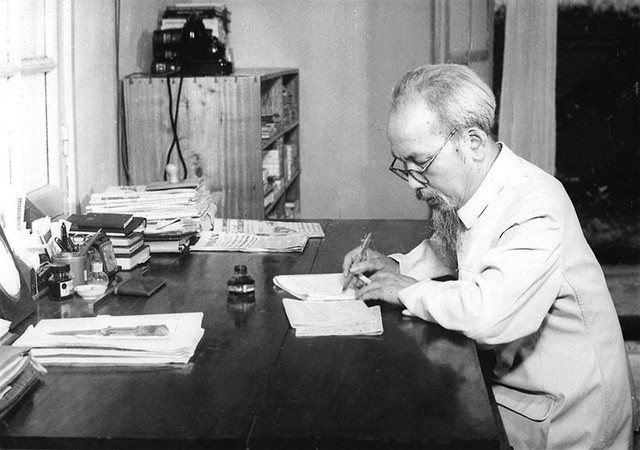
Thoughteconomy,integrity,mainThis was consistently and profoundly expressed throughout Ho Chi Minh's revolutionary life and had a powerful influence on many generations of cadres and Party members. Even as he was nearing death, as the leader of the Party and the State, President Ho Chi Minh still wanted to save the people's time and money. He wished to be cremated in the traditional manner so that he could return to the people of the three regions of North, Central, and South Vietnam; to return to nature on cool, breezy hills, to continue contributing to economic development, protecting the natural world and ecosystems, and to be reunited with all strata of the people, including the elderly. Humanity and nature were two close companions, intimately connected to him.
InTestament,Ho Chi Minh's thought on humanity is intertwined with the concepts of the people, the nation, the various social groups, the people of the lowlands and highlands, and the people of the world... In this context, each individual possesses a unique personality and dignity. If we trust them with tasks, unite them, encourage their spirit and abilities, then every individual in that national community will wholeheartedly dedicate themselves to leading the cause of resistance and national construction to success.
3. Reflections on the post-war era
InTestamentIn the May 1968 supplement, President Ho Chi Minh advocated that, immediately after the victorious conclusion of the war against the US, the crucial task that the entire Party, army, and people must strive to accomplish is to quickly heal the serious wounds caused by the war. He stated, “This is a huge, arduous, complex, but also very glorious task. We must have a ready, clear, and thorough plan to avoid being passive, lacking, and making mistakes. In my opinion, the first thing that needs to be done is…”reorganize the Party"This will ensure that every Party member, every Youth Union member, and every Party branch strives to fulfill the tasks assigned by the Party, wholeheartedly serving the people. If we can do that, then no matter how great or difficult the task, we will certainly succeed."[25].
Thus, along with quickly healing the wounds of war, rebuilding cities, constructing villages, developing the economy, and reforming the education system to suit the new circumstances, the special concern and greatest worry of President Ho Chi Minh was the rectification of the Party, clearly defining the goals and tasks of the Party in the new era. To achieve this, the Party must practice broad, regular, and serious self-criticism and criticism; this is the best way to consolidate and develop unity and solidarity within the Party, and the key point is "There must be comradely love and affection for one another." He instructed cadres and Party members from the Central Committee to the branches to safeguard unity and solidarity within the Party "as carefully as one protects the pupil of one's eye."[26]That is the most important principle in Party building work. Thoroughly internalizing this ideology...TestamentGeneral Secretary Le Kha Phieu analyzed: “Regarding Party rectification, Uncle Ho did not consider it a temporary measure but an essential and ongoing task to fulfill the Party's leadership role, a self-development of the Party in the process of revolutionary development. When the revolution faces difficulties, Party rectification is necessary to build a calm, clear-sighted attitude, a firm stance, and to prevent wavering and pessimism; when the revolution is on the path to victory, Party rectification is necessary to prevent arrogance, subjectivism, complacency, and naive optimism; when the Party is in power, Party members can easily lose themselves; yesterday's greatness does not necessarily mean they will still be loved by everyone today if they are not upright and fall into individualism. Therefore, Party rectification must be given importance.”[27].
Along with rectifying the Party, he paid special attention to the social and human changes in the post-war period and identified them asthe first task to do. InTestamentOne always sees a profound emotion emanating from Ho Chi Minh regarding the lives of all classes of people, especially cadres, soldiers, militia, guerrillas, and youth volunteers... those in the most arduous fighting positions, who suffered the most sacrifices and losses. (In response to a reporter's question)GranmaIn Cuba on July 14, 1969, he expressed: "Each person, each family has their own suffering, and when all the individual sufferings of each person and each family are combined, they become my suffering."[28]With Ho Chi Minh, compassion and the ideology of "Easing the burden on the people is the best strategy for building a strong and lasting foundation for the nation." of Hung Dao Dai Vuong Tran Quoc Tuan, "The essence of benevolence lies in ensuring the people's peace.The words of the renowned cultural figure Nguyen Trai... seem to always permeate his thoughts and actions. He believed that our people are very heroic, always follow the Party, and are very loyal to the Party. Therefore, the Party must have a very good plan to develop the economy and culture, in order to...continuously improving the people's living standards.[29],At the same time, we must continuously inspire confidence, pride, and a drive to succeed in these people.
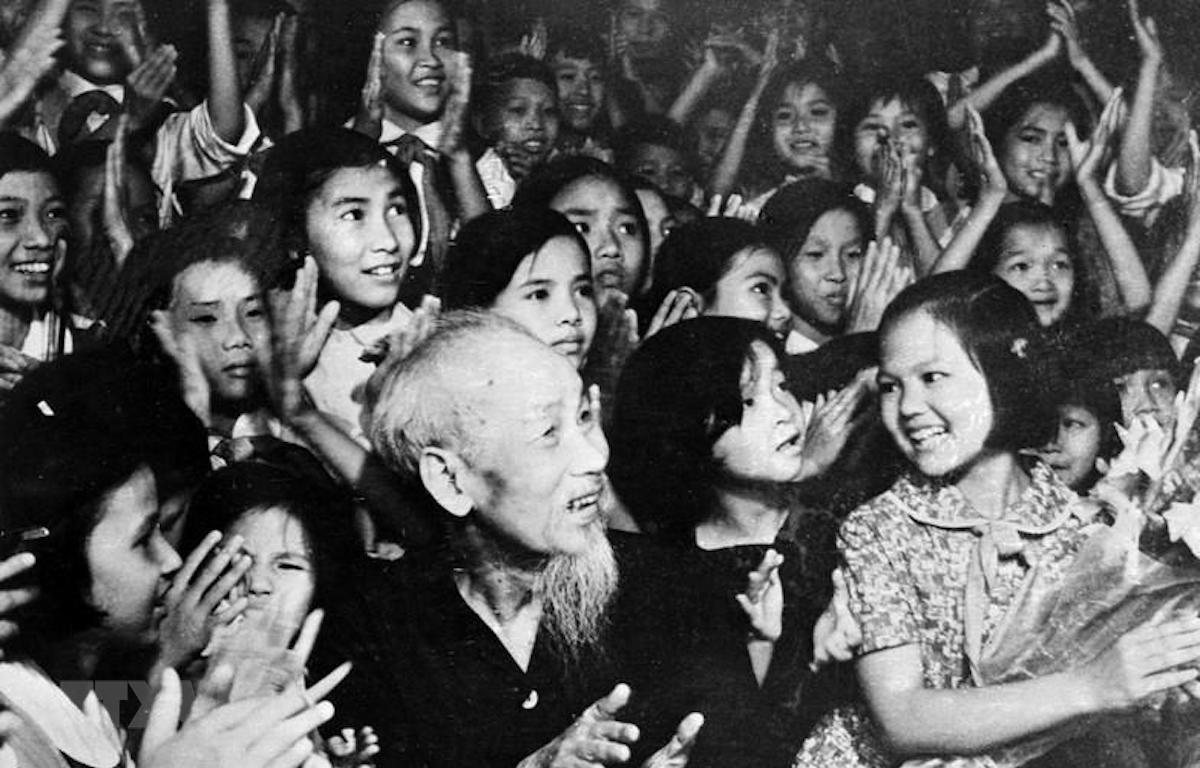
InTestamentHe instructed that the contributions of heroes and martyrs must be remembered forever to instill patriotism in the people. For the parents, wives, and children of wounded soldiers and martyrs who lack the ability to work and are in need, the government must help them find suitable employment, ensuring they do not suffer from hunger or cold. He cared about training and vocational skills for young soldiers and volunteer youth; he paid attention to the lives of the peasant class, as this was the force that had sacrificed and contributed much manpower and resources to the resistance cause. He proposed a one-year exemption from agricultural taxes for agricultural cooperatives "to bring joy and satisfaction to the people, boosting their enthusiasm and production."[30]Here, the humanitarian ideals of our ancestors in political conduct after the storms of war have passed are embodied in Ho Chi Minh's political thinking. He always remembered everyone and never forgot the merits of anyone.[31]Understanding the characteristics of Vietnamese society, and constantly guiding and monitoring national movements, Ho Chi Minh always highly valued the role of women in the family and society, in combat and production... The views on gender equality; class and status equality; no distinction between "rich and poor," differences in occupation; and genuine trust, love, and respect for human beings are typical values in Ho Chi Minh's humanism, and at the same time clearly express the core viewpoint: The country belongs to the people, the Party belongs to the people, and the State belongs to the people.
Following the political developments of 1968-1969, he foresaw the immense difficulties and challenges that the entire Party, army, and people would undoubtedly have to overcome to achieve final victory. Ho Chi Minh always demonstrated a strong belief in the nation's ultimate triumph. Regarding the reconstruction of the country, he clearly stated: "This work is very great, arduous, and complex, but also very glorious."[32]It was a "gigantic battle," therefore it required mobilizing the entire population and relying on the great strength of the people to achieve victory.
In his strategy for building human resources, along with always encouraging political education and moral training, he also paid great attention to the cultural, professional, and technical training of the younger generation, because "they are the main force in the successful construction of socialism in our country."[33]According to Ho Chi Minh, everyone must have new knowledge to participate in the nation-building process. The desired social model depends on the people who can adapt to and master that model. He always valued culture, raising the cultural level of the people, and considered it a fundamental element in his strategy of "cultivating human resources" for the benefit of the nation for centuries to come and for its longevity.
Concluding remarks
ButTestamentPresident Ho Chi Minh's writings are a unique document of great historical significance and value, helping us to better understand the country, its people, and its era.TestamentThis document summarizes history, sparks much thought, and identifies the major tasks and work that the Party and State need to focus on leading and resolving, both during wartime and after the successful reunification of the country.TestamentThese teachings demonstrate his profound affection for the people and the country, his unwavering belief in the ultimate victory and the promising future of Vietnam, its people, and its culture. Many profound ideas can be found in his simple teachings because: “Every word and deed of Ho Chi Minh was practical and concrete; he acted on his words, often doing more than he spoke, sometimes acting without needing to speak, his thoughts manifesting in his actions.”[34].
- With the vision of a national liberation hero and an outstanding cultural figure, thisTestamentThis work profoundly portrays the cultural personality of Ho Chi Minh – a unique, profound, warm, simple, and expansive personality. It is precisely this broad political vision and cultural stature that has earned President Ho Chi Minh the love and respect of people around the world. He is a symbol of the courage, unwavering will, and heroism of the Vietnamese people, a vivid embodiment of the unity between theory and practice, between thought and action. His perspective and approach to humanity and culture reflect the depth of Vietnamese and Asian intellectual traditions, while also containing many great philosophies of development for the era.
- Written half a century ago, the historical context both domestically and internationally has changed considerably, but it is still readable.TestamentReflecting on his teachings, one always sees President Ho Chi Minh's profound and radiant compassion for humanity. His thoughts on human rights permeated his thinking, actions, policies, and revolutionary tasks throughout different periods. He fought to elevate human rights to the level of national interests. The ideal of humanity that Ho Chi Minh always educated and aimed for was "loyal to the Party, devoted to the people," humble, honest, living with ideals, acting with a proactive spirit, and always seeking improvement. His deep affection and forward-thinking ideas about the country, its people, and its culture remain etched in the memories of millions of Vietnamese people, symbolizing "the indomitable will of the Vietnamese people."[35], and at the same time, it is a symbol of a future culture for humanity.[36]These humanistic values help us to better understand the thoughts, sacrifices, and dedication that are "extremely noble and rich, extremely pure and beautiful."[37]President Ho Chi Minh's contributions to the cause of resistance and national construction in the past, as well as to the current task of building and protecting the Fatherland and integrating into the international community.
[1]Nguyen Van Linh:Welcome address to the International Conference: President Ho Chi Minh - Hero of National Liberation,great cultural center, UNESCO and the Vietnam Social Sciences Committee, Social Sciences Publishing House, Hanoi, 1990, p. 10.
[2]Tran Van Giau:Ho Chi Minh's humanism – Characteristics and origins, in President Ho Chi Minh - Hero of National Liberation, Great Cultural Figure, op. cit., p. 241.
[3]Song Thanh:Ho Chi Minh - An outstanding cultural figure, National Political Publishing House, Hanoi, 2015, p. 38.
[4]TN Kaul:President Ho Chi Minh - the great Vietnamese patriot, a great friend of the Indian people and all of humanity., in President Ho Chi Minh - Hero of National Liberation, Great Cultural Figure, op. cit., pp. 26-27.
[5]See articles in the Vietnam Historical Science Association - Vietnam Publishers AssociationHo Chi Minh - The man who brought light, Publishing House of the Era - Past & Present Magazine, Hanoi, 2011.
[6]Le Mau Han:The national strength of the Vietnamese revolution under the light of Ho Chi Minh's ideology., National Political Publishing House, Hanoi, 2017, pp. 33-36.
[7]Pham Van Dong:Ho Chi Minh - The Man, in Our Prime Minister Pham Van Dong, Ho Chi Minh City General Publishing House, 2006, p. 452.
[8]Speech by Fidel Castro delivered in Hanoi in September 1973. See Miguel de Stéphano:Ho Chi Minh - A man of humanity, in President Ho Chi Minh - Hero of National Liberation, Great Cultural Figure, op. cit., p. 52.
[9]Vu Duong Ninh:The Vietnamese Revolution on the International Chessboard - History and Issues, National Political Publishing House, Hanoi, 2016, pp. 39-48; Multiple authors:Ho Chi Minh - An Asian figure of all time, National Political Publishing House, Hanoi, 2010.
[10]Dinh Xuan Lam:The anti-colonial movement in Vietnam, Education Publishing House, Hanoi, 2015, pp. 204-217.
[11]Vo Nguyen Giap:President Ho Chi Minh - Hero of national liberation, great cultural figure, in President Ho Chi Minh - Hero of National Liberation, Great Cultural Figure, p. 14.
[12]Remarks by Dr. Modagat Ahned, Director of UNESCO's Asia-Pacific Region, Special Representative of the Director-General of UNESCO, at the opening session of the international conference "President Ho Chi Minh - Hero of National Liberation, Great Cultural Figure of Vietnam" commemorating the 100th anniversary of President Ho Chi Minh's birth (May 19, 1890 - May 19, 1990).
[13]Pham Van Dong:President Ho Chi Minh - The image of the nation, in Our Prime Minister Pham Van Dong, Ho Chi Minh City General Publishing House, 2006, p. 333.
[14]Vo Nguyen Giap:President Ho Chi Minh - Hero of national liberation, great cultural figure, Ibid., p. 16.
[15] Complete Works of Ho Chi Minh, Volume 4 (1945-1946), National Political Publishing House, Hanoi, 2011, p. 1.
[16] Complete Works of Ho Chi Minh, Volume 4 (1945-1946), op. cit., p. 2.
[17]Ha Minh Duc:Ho Chi Minh – A national hero and his enduring significance., National Political Publishing House, Hanoi, 2018, p. 271.
[18]Before his passing, he said: "I dedicate my whole life to my people."Complete Works of Ho Chi Minh, Volume 15 (1966-1969), op. cit., pp. 674-677.
[19]Pham Van Dong:Ho Chi Minh - The Man, Ibid, p. 454.
[20]Pham Van Dong:Ho Chi Minh - The Man, Ibid, p. 453.
[21]Vu Ky:Uncle Ho wrote his will.(The Century Records), National Political Publishing House, Hanoi, 1999, p. 65.
[22]Tran Van Giau:Ho Chi Minh's Humanism - Characteristics and Origins, op. cit., p. 240. According to General Vo Nguyen Giap, respecting women is one of the fundamental criteria that demonstrates the new and different thinking in Ho Chi Minh's thought compared to traditional Confucianism. Vo Nguyen Giap:Concluding remarks at the International Conference: President Ho Chi Minh – Hero of National Liberation, Great Cultural Figure, Ibid, pp. 244-245.
[23]Viet Phuong:Some stories about President Ho Chi Minh's daily life., National University of Hanoi Publishing House, Hanoi, 2000, pp. 18-19.
[24]TN Kaul:President Ho Chi Minh - the great Vietnamese patriot, a great friend of the Indian people and all of humanity., in President Ho Chi Minh - Hero of National Liberation, Great Cultural Figure, op. cit., p. 24.
[25] Complete Works of Ho Chi Minh, Volume 15 (1966-1969), op. cit., p. 616.
[26] Complete Works of Ho Chi Minh, Volume 15 (1966-1969), op. cit., p. 611
[27]Le Kha Phieu:Speech at the ceremony commemorating the 109th anniversary of President Ho Chi Minh's birth and the 30th anniversary of the implementation of his Last Will and Testament., in: The Testament of President Ho Chi Minh, National Political Publishing House, Hanoi, 1999, p. 57.
[28] Complete Works of Ho Chi Minh, Volume 15 (1966-1969), op. cit., p. 674.
[29] Complete Works of Ho Chi Minh, Volume 15 (1966-1969), op. cit., p. 612.
[30] Complete Works of Ho Chi Minh, Volume 15 (1966-1969), op. cit., p. 617.
[31]Pham Van Dong:President Ho Chi Minh - The image of the nation, Ibid, p. 340.
[32] Complete Works of Ho Chi Minh, Volume 15 (1966-1969), op. cit., p. 617.
[33] Complete Works of Ho Chi Minh, Volume 15 (1966-1969), op. cit., p. 617.
[34]Pham Van Dong:Ho Chi Minh - The Man, Ibid, p. 454.
[35]Eulogy delivered by Comrade Le Duan, First Secretary of the Central Committee of the Vietnam Workers' Party, at the funeral of President Ho Chi Minh. SeeThe Testament of President Ho Chi Minh, Ibid, p. 42.
[36]Osip Mandelstam:Visiting a Communist International fighter - Nguyen Ai Quoc, The Little Flame Magazine (Soviet Union), No. 39, December 23, 1923.
[37]Eulogy by the Central Committee of the Vietnam Workers' Party -The Testament of President Ho Chi Minh, Ibid, p. 41.
The article was published in Communist Magazine No. 927 (10), 2019, pp. 26-32.
Author:Prof. Dr. Nguyen Van Kim